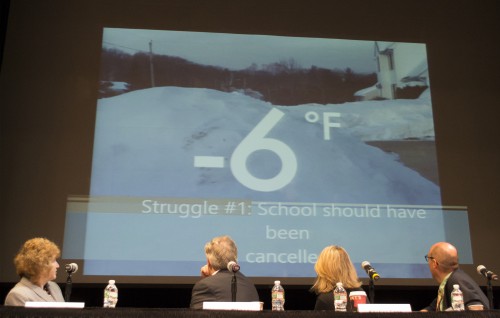By now, commuters are well aware of the report commissioned by Governor Charlie Baker to identify problems and propose solutions for the Massachusetts Bay Transportation Authority.
On Tuesday, Suffolk University’s Center for Real Estate partnered with the Greater Boston Real Estate Board and hosted a panel of transportation experts to debate and discuss the report’s findings and proposals in C. Walsh Theater.
Before the panelists spoke, moderator Peter Howe, business editor of NECN, played a video created by Suffolk students for a class assignment to remind the audience and panel what commuters faced as the MBTA’s service faltered this winter.
Set to the song, “Everybody Hurts” by R.E.M., the video showed photos of commuters waiting for buses in the snow, cramming into subway cars and looking at countdown clocks showing wait times of “20+” minutes for the next train. The montage featured several struggles the students underwent, such as the grueling conditions they had to brave in order to get to class on time.

Sam Humphrey/Journal Staff
While the panelists acknowledged that problems regarding the MBTA are severe but not completely beyond repair, they differed on what exactly should be done to fix the agency as a whole.
“We want to own the T,” said Stephanie Pollack, Massachusetts’ transportation secretary, but she acknowledged that administration needs tools like a control board as well as a chief administrative officer that can be an accountable resource for the governor. She also said contracting out certain services, such as underused late night bus routes, would also help save money.
Pollack defended Baker’s budget proposal for 2016, released on Monday, and the bill he proposed in April to establish a fiscal and management control board. In the bill, Baker proposed to eliminate $500 million in funding for the state transportation system.
“The idea that we have taken half a billion dollars off the table is absurd,” said Pollack. Despite the cutback, she did guarantee that the state will continue funding for half of the MBTA’s operating budget.
Research Director Greg Sullivan of the Pioneer Institute, a Boston-based think tank, also supported Baker’s budget proposal and its focus on controlling the agency’s costs. He said that providing a one way ride on, “THE RIDE,” the MBTA’s paratransit service, costs the agency $49 on average. By comparison, the paratransit service operated by MassHealth costs $17.
But not everyone on the panel agreed with the report’s findings.
“The T doesn’t have a spending problem, it has an investment problem,” said James Aloisi, who briefly served as transportation secretary under former Governor Deval Patrick. He suggested shifting some of the state’s highway funding to the MBTA instead of raising fares for riders.
President of the Massachusetts Taxpayers Foundation Eileen McAnneny, stressed that the MBTA’s capital budget needed to be separated from its operating budget and the agency needs a plan to prioritize its funding on maintenance.
Kristina Egan, panelist and director of an advocacy group for Massachusetts transportation, “Transportation for Massachusetts,” thinks legislature should be part of the solution, too.
James O’Leary, who served as the MBTA’s general manager from 1981 to 1989, believes the agency needs to invest in additional training for its personnel and implementing metrics to measure employees’ performance.
Though Baker’s report found many problems with the MBTA’s personnel management, including high rates of absenteeism, it would be unfair to use employees as a scapegoat for the MBTA’s problems, said O’Leary.
One audience member stressed the need for transparency on all issues and developments and asked the panel if there were ways for the public to track the MBTA’s improvements. While some panelists echoed the same sentiments, Pollack addressed the inquiry sharing that the MBTA will begin to move from tracking operations metrics to service metrics to improve its service and performance.

















